|
|
|
Sort Order |
|
|
|
Items / Page
|
|
|
|
|
|
|
| Srl | Item |
| 1 |
ID:
086029
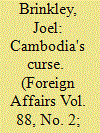

|
|
|
|
|
| Publication |
2009.
|
| Summary/Abstract |
Theary Seng often thinks of that April morning in 1975 when she watched her parents cheering on the Khmer Rouge as its soldiers marched into Phnom Penh. She was four years old. Within days, Pol Pot's foot soldiers had killed her father; three years after that, her mother died in a prison compound. Today, Theary Seng runs a nonprofit legal-advocacy group in Phnom Penh. She is eager to move on. But the rest of Cambodia, and much of the world, remains mired in the nation's sorrowful past. During its four-year reign, the Khmer Rouge killed as many as two million people. Nowadays, the venal government of Prime Minister Hun Sen may take "ten lives or even a hundred lives," she told me in August, "but what's that compared to two million? That's still the Cambodian standard, and that's the international standard." The devastation Pol Pot wreaked on his country remains hard to comprehend, even three decades later. His goal, as he put it, was to return Cambodia to "year zero" and transform it into an agrarian utopia. To that end, he purged his nation of educated city dwellers, monks, and minorities, while imposing a draconian resettlement program that uprooted almost everyone else. These measures led to the deaths of one-quarter of the country's population. The Khmer Rouge fell in 1979, when Vietnam invaded Cambodia and replaced the regime with a puppet government, in which Hun Sen became the foreign minister. When Vietnamese forces pulled out ten years later, they left behind several Cambodian factions battling for control. Then, in 1991, these groups' leaders signed a UN-sponsored peace accord, giving Cambodia the extraordinary opportunity to start over. Before Iraq, Afghanistan, Somalia, and even the Balkans, Cambodia was the international community's grand nation-building project. The country's new constitution awarded Cambodians the human rights, personal freedoms, and other protections of a modern democratic state. And in 1993, the United Nations staged a national election to select a democratic government. After the horrors of the Khmer Rouge, Cambodia would remake itself at last, and its people would have a chance to thrive.
|
|
|
|
|
|
|
|
|
|
|
|
|
|
|
|
| 2 |
ID:
125199
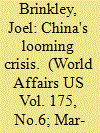

|
|
|
|
|
| Publication |
2013.
|
| Summary/Abstract |
China's in deep, deep trouble, and its new leaders know it. The growth of the nation's GDP has continued to slow every quarter since late 2010-though it did tick up slightly in the state's latest quarterly report, published in January. But that's just one of many problems. In the simple words of D&B Country RiskLine Reports' year-end assessment of China, "Trend: deteriorating."
|
|
|
|
|
|
|
|
|
|
|
|
|
|
|
|
| 3 |
ID:
128395
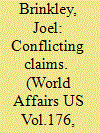

|
|
|
|
|
| Publication |
2014.
|
| Summary/Abstract |
Most everyone has heard of the South China Sea debate, the enduring argument between China and most every other state that has a coastline on that waterway. From Indonesia to the Philippines, every state is angry with China over its claim that it maintains full ownership rights to nearly all of the sea's islands and resources.
|
|
|
|
|
|
|
|
|
|
|
|
|
|
|
|
| 4 |
ID:
128429
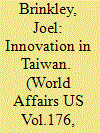

|
|
|
|
|
| Publication |
2014.
|
| Summary/Abstract |
Taiwan's president, Ma Ying-jeou, sat in a low leather chair looking out over the vast presidential conference room of his Taipei office. On the wall behind him hung a portrait of Sun Yat-sen, the Chinese icon who is credited with the revolution a century ago that ended two thousand years of imperial rule. Under Ma's feet lay a light blue carpet festooned with white representations of ocean waves. Overhead, white cloth, styled like ship sails, covered the ceiling lights-all of it intended to represent Taiwan's journey away from mainland China. Asian conference rooms are unlike those in the West. There's no mahogany conference table. Instead, plush chairs are arranged in a U shape. And the conference leader, in this case President Ma, sits at the center with his conferees to his left and right-university professors, think tank leaders, and government officials from Asia and the West who were there for a conference on the East China Sea debate between Taiwan, China, and Japan.
|
|
|
|
|
|
|
|
|
|
|
|
|
|
|
|
| 5 |
ID:
125215
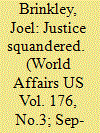

|
|
|
|
|
| Publication |
2013.
|
| Summary/Abstract |
Cambodian Prime Minister Hun Sen was preparing to fight a civil war in 1997 when a senior United Nations official stopped by to ask if he'd like help putting the former leaders of the Khmer Rouge on trial. With a figurative wave of the hand, Hun Sen, a former Khmer Rouge commander himself, said in effect: Sure, go ahead. At that moment, his mind was obviously elsewhere.
|
|
|
|
|
|
|
|
|
|
|
|
|
|
|
|
| 6 |
ID:
122103
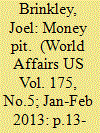

|
|
|
|
|
| Publication |
2013.
|
| Summary/Abstract |
More than half of Afghanistan's population is under twenty-five, which shouldn't be surprising since the average life span there is forty-nine. But the United States Agency for International Development looked at this group and decided it needed help because, it said, these young people are "disenfranchised, unskilled, uneducated, neglected-and most susceptible to joining the insurgency." So the agency chartered a three-year, $50 million program intended to train members of this generation to become productive members of Afghan society. Two years into it, the agency's inspector general had a look at the work thus far and found "little evidence that the project has made progress toward" its goals.
|
|
|
|
|
|
|
|
|
|
|
|
|
|
|
|
| 7 |
ID:
118885
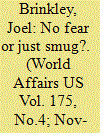

|
|
|
|
|
|
|
|